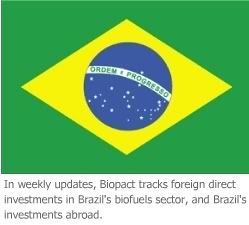Brazilian biofuels update
 This is the second of our weekly updates on what's happening in Brazil's biofuels sector (the first update can be found here).
This is the second of our weekly updates on what's happening in Brazil's biofuels sector (the first update can be found here).The past seven days have seen Jamaica and Brazil signing two agreements under which the South American nation will assist with the island state with:
- modernising its local sugar industry, and training Jamaicans in production and management practices in the sugar industry
- help Jamaica develop ethanol, by providing technical assistance and by identifying various sugar cane varieties that are adaptable to Jamaican conditions, including those resistant to drought.
- discussions with COSAN, Brazil's largest sugar company, on their possible involvement in the local sugar and ethanol sectors
- providing technical assistance to Jamaica in the production of castor bean oil for use as a biodiesel feedstock
A new Dutch-Japanese joint-venture called Agrenco Bioenergia was created this week, aimed at producing both liquid and solid biofuels in Brazil. Holland's Agrenco, already active in Brazil, and Japan's trading company Marubeni Corp join forces to invest at least €122/US$160 million in:
- three biodiesel factories with a production capacity of 400,000 tons of biofuel per year; the main feedstock will be soybeans, sourced from local farmers
- two biomass-burning electricity generation plants, to feed electricity to the Brazil national grid
- to supply the biomass plants, 10,000 hectares of land have been acquired for the cultivation of Pennisetum purpureum K. Schumach, also known as 'elephant grass' or 'napier grass', a fast growing tropical energy crop
 biomass :: bioenergy :: biofuels :: energy :: sustainability :: ethanol :: biodiesel :: Jamaica :: Japan :: Brazil
biomass :: bioenergy :: biofuels :: energy :: sustainability :: ethanol :: biodiesel :: Jamaica :: Japan :: BrazilConsultants told Reuters that in 2006 there were nine mergers and acquisitions in the booming sugar and ethanol sector, and there should be even more in 2007, according to KPMG consultancy's Brazilian unit, pointing out that the record number of deals was 11 in 2001.
Two of Brazil's largest sugar and ethanol producers, Cosan and Sao Martinho , have led a trend by listing their shares on the Sao Paulo stock exchange, raising funds for further expansion. Others, such as Copersucar, Crystalsev and J. Pessoa Group are considering a similar move.
"Consolidation will accelerate as producers become better capitalized...the sector is still highly fragmented," said Andre Castello Branco, KPMG corporate finance partner, whose company is working on 10 M&A projects.
He noted that the 20 biggest sugar and ethanol producers accounted for less than 50 percent of Brazilian cane output.
However, a public share offering is an option open to only the half dozen largest producers, said Marcio Vieira , partner at PricewaterhouseCoopers in Brazil, adding that companies first had to improve financial management and transparency.
Complicated family ownership of many companies was another obstacle to takeovers.
Despite the obstacles, foreign investors are coming to Brazil.
"We're seeing a lot of foreign investors coming in either as partners or through investment funds," said MBAgro's Hausknecht.
European producers and trade houses have also been investing in Brazil as domestic sugar output falls due to cutting of subsidies.
Last week, the Brazilian unit of French commodities group Louis Dreyfus announced the purchase of four sugar and ethanol mills from the Tavares de Melo group.
Dreyfus, which has three mills in Brazil, said it will raise its cane crush to 18.5 million tonnes, from 11.8 million, in 2009.
A battle is also raging for control of Brazil's current No. 2 sugar and ethanol producer, Companhia Vale do Rosario, after a minority group of family shareholders rejected a bid by Cosan and exercised their right to make a matching offer.
"Some form of merger will take place. The question is with whom...Cosan, Santa Elisa and Bunge have been involved," KPMG's Castello Branco said.
 -------------------
-------------------
 Spanish company Ferry Group is to invest €42/US$55.2 million in a project for the production of biomass fuel pellets in Bulgaria.
The 3-year project consists of establishing plantations of paulownia trees near the city of Tran. Paulownia is a fast-growing tree used for the commercial production of fuel pellets.
Spanish company Ferry Group is to invest €42/US$55.2 million in a project for the production of biomass fuel pellets in Bulgaria.
The 3-year project consists of establishing plantations of paulownia trees near the city of Tran. Paulownia is a fast-growing tree used for the commercial production of fuel pellets.









0 Comments:
Post a Comment
Links to this post:
Create a Link
<< Home